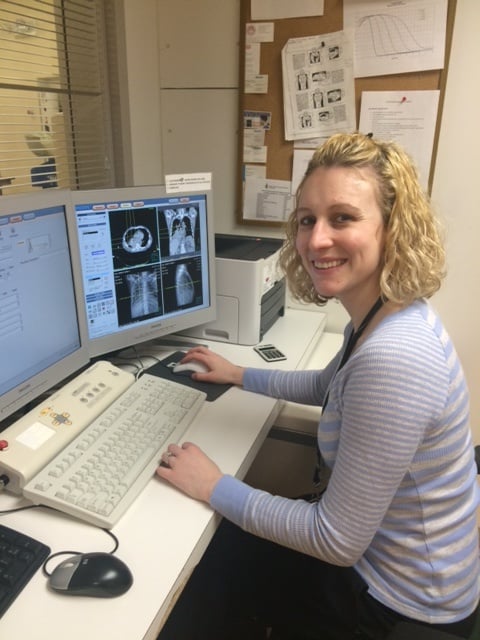BSN stands for Bachelor of Science in Nursing, which is an undergraduate-level degree for students who want to become registered nurses, also known as RNs.
There are several types of BSN programs; depending on your prior education and experience, you may choose a 4-year program, an accelerated program, or an RN-to-BSN program.
Typically, studies in BSN programs include not only patient care skills, but also safety and quality within the healthcare system, patient care technology, research, and health promotion. A Bachelor of Science in Nursing degree is a predecessor to a Master of Science degree in Nursing. By earning your BSN, you’ll be learning advanced nursing skills that can increase your options for employment.
Here is a breakdown of the types of BSN degrees there are:
-
4-Year BSN: This degree operates just like any other 4-year degree program. However, at the end of these programs, graduates are eligible for the NCLEX-RN exam to become a registered nurse.
-
Accelerated BSN: Accelerated programs are much shorter and typically can be completed in 1.5 to 2 years. Students who are looking to complete an Accelerated BSN must have a prior bachelor’s degree – typically in any field. These programs are intensive, as they require extensive clinical hours and are accompanied by a competitive and challenging curriculum.
-
RN-to-BSN: RN-to-BSN programs are also known as completion degrees. To acquire this degree, you must enter the program as an RN. Because students in an RN-to-BSN program are already registered nurses, these types of programs have less of a clinical component, and focus more on leadership and management, evidence-based practice and research skills, advanced pathophysiology, and critical thinking.
Nursing is a profession with many entry points, depending on your education and credentials, so it’s important to choose the type of program and entry point that’s right for you. For example, you can become an RN through an associate degree program or a bachelor’s degree program. Higher education standards are changing, encouraging more and more nurses to earn their BSN. Over the last several years, medical facilities have started to require a larger portion of nurses to have a bachelor of science in nursing (BSN) degree. According to recent studies, improved patient outcomes are inherent when nursing staff members have higher degrees. With a more extensive educational background comes better care and more job opportunities.
BSN programs are made up of general education classes, clinicals, and specialized nursing classes, though how those courses are distributed can differ by the program type. For example, in our RN to BSN program at Labouré, there is only one clinical course - a mentorship opportunity that allows students to focus on an area of nursing that interests them. Programs like the RN to BSN have less of a clinical component because students are already registered nurses - meaning they’ve done the vast majority of their clinical studies during their associate degree RN programs. A traditional 4-year BSN program or an accelerated BSN program, however, will require extensive clinical hours to prepare their students for the NCLEX. Some other common classes included in BSN curriculums are:
In order to receive the degree, it is important to note how many clinical hours you need, depending on your school and state licensing board.
How to Get Started | Steps You Can Take to Earn Your BSN Degree
How to Get Your BSN If You Are Just Starting Out
You do not have to have prior nursing experience to earn a BSN. If you want to pursue a BSN, you can enter a traditional 4-year bachelor’s of science in nursing program. In this program, you will take a variety of general education courses, specialized nursing courses, and clinical courses that will provide the hands-on training you need to become a licensed nurse. At the end of your program, you will take the NCLEX-RN exam to earn your Registered Nurse credential. If you already have a bachelor’s degree and are looking to change careers, the good news is that you don’t have to start a new 4-year program! Rather, you can utilize an accelerated program that will last anywhere from 1.5 to 2 years. Accelerated programs often have strict admissions requirements due to the intensive nature of the program. For either type of program, you’ll want to make sure you work with an academic advisor or admissions counselor to determine which courses you’ll need to take, and whether any prior coursework you’ve completed will transfer in.
How to Get a BSN if You Are Already Working as an RN
Registered nurses who want to earn their BSN will need to look for an RN-to-BSN program. Admissions counselors for these programs will consider your academic history and past degrees as well as your nursing history. Earning your BSN credential can qualify you for more and potentially better paying jobs as your RN to BSN curriculum will focus on advancing the skills you’ve already learned in your RN program. Many RN to BSN programs are set up to be flexible, online programs for working nurses to finish their BSN degree. As a working nurse, it’s imperative to find a program that is flexible, reliable, and affordable, and one that you can complete around your work hours.
How to Get a BSN if You Are an LPN or an LVN
If you are not an RN yet but have another nursing credential such as a license as a Certified Nurse Aide (CNA), Licensed Practice Nurse (LPN) or Licensed Vocational Nurse (LVN), you may consider a bridge program to earn your BSN. Bridge programs allow you to achieve your goals at a faster pace by offering a curriculum that helps you meet the goals and outcomes of a BSN program without having you repeat classes or experience that you’ve already done. Some bridge programs - like the one we offer at Labouré - will have LPNs first become Registered Nurses through an accelerated associate degree program before enrolling you in an RN to BSN completion program.
What Kind of Jobs You Can Have
When you have a BSN degree, your job opportunities expand rapidly. While we can’t list them all, some opportunities you may consider might be:
Public Health Nurse
With a BSN, you can advocate for disease prevention, work for healthcare programs and government services, and you will be able to educate local communities on healthcare access. Considering the lingering impacts of COVID-19, gaining a BSN can be an excellent tool to have more access to jobs in the Public Health Nursing sector.
Quality Assurance and Improvement Coordinators
If you are familiar with the Affordable Care Act, one of its fundamental components is using ratings as a metric to evaluate quality care. With a BSN, you can find a job working as a quality assurance coordinator. Moreover, with clinical experience, you can provide data analytics and compliance standards to ensure better quality care in medical facilities. By pursuing quality assurance or similar positions, you will be able to have a long lasting and positive impact on the patients and company you are working for.
Nurse Recruiter
Another great job opportunity for nurses who hold BSN degrees is to work as a nurse recruiter. In this position, you will recruit RNs, aspiring RNs, licensed practical nurses (LPNs), or undergraduate nursing students who are looking to fill positions within the field. To complete this job, you will post advertisements, attend job fairs, conduct interviews, and connect applicants with programs that align with their goals.
Clinical Research Nurse
If you are interested in performing research in the fields of clinical nursing and pharmaceuticals, then pursuing a BSN may be a good option for you. Nursing is a field that constantly incentivizes employees to continuously learn. Working as a clinical research nurse, you will work to discover new trends in the medical field, develop new cures for various illnesses, and study disorders and diseases while also studying patients, organizing research trials, and creating datasets.
With these options in mind, we are only scratching the surface as to what you can accomplish with a BSN degree. After going through the program and clinical hours to earn your BSN, you will have more experience than you ever could have imagined. And regardless of where you want to take your career next, you will have job options.
Benefits, Advantages and Expected Salaries
There are many advantages that come with earning a BSN degree. These advantages typically include increased employment opportunities, larger paychecks, the ability to provide higher-quality care while also being capable of taking on roles with increased responsibility. This may also include more advanced leadership positions as well as advanced patient care opportunities including working with adults suffering from chronic and composite health conditions. Getting a BSN degree opens doors to more opportunities than you could imagine. Whether you are looking to work with more complex patient demographics or are simply looking to make more money, earning a BSN can help you do both.
Here is what the expected salaries look like:
When starting as a BSN, the average salary is estimated to be about $86,694 per year. However, several factors including which city or state you live in, your specific employer, and your prior nursing experience (if any) can impact how much you will make immediately following your graduation. Over the next five years, BSN salaries are projected to increase. Overall, there is no doubt that with time, BSN degree-holders will be earning more than they have, at an all-time historic rate.
The BSN Program at Labouré | How We Can Help You Take the Next Step in Your Career
Flexible and affordable for the working nurse, Labouré College of Healthcare’s RN-to-BSN program will help you take your career to the next level. With six start dates each year, our 100% online courses are offered in 7-week modules, making it fast and easy to complete your degree on your schedule. The online format makes it easy for nurses on any shift to participate in discussion boards and complete their coursework. Students can transfer up to 90 credits from previously completed college coursework. Students with no transfer credit can complete the program in as little as 16 months, while students with transfer credits may finish sooner.
Not only is our program fast, flexible, and online - it’s also affordable. At just $375 per credit, Labouré’s program is one of the lowest priced online RN to BSN programs in Massachusetts.
Labouré offers a variety of ways to connect with professors, students, and seasoned faculty online and - if you choose - in person. The majority of our students love how personalized our program is, as we tend to each individual student’s learning experience. Some professors even report that they know their online students better than their face-to-face students because they’re constantly communicating with them through email, discussion boards, or online chats. Our program satisfaction rates are high and at least 80% of our graduates are employed by the time they complete their RN-BSN program. When choosing Labouré to earn your BSN degree, you are choosing a program that values discipline, lifelong learning, and delivering patient-centered care.
Get the most out of your BSN degree here at Labouré. Before you know it, you will be ready to reap the benefits! For more information, send us an email, give us a call, or - if you’re ready to take the next step - apply today!






Comments